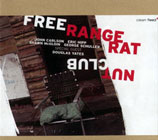Home » Jazz Articles » Profile » Butch Warren
Butch Warren
 A couple of years ago, advertisements appeared in the local free DC weekly for informal Wednesday evening jam sessions featuring Butch Warren at Twins Lounge. I recall eagerly calling the club to ask whether this was the former bassist who had extensively recorded on many a classic Blue Note album. Although the club didn't offer confirmation, I sensed that the former Washingtonian was once again flirting with music in his hometown. But no sooner had I decided to make the late evening weeknight venture, had Warren's name been removed from the schedule and, once again, he disappeared.
A couple of years ago, advertisements appeared in the local free DC weekly for informal Wednesday evening jam sessions featuring Butch Warren at Twins Lounge. I recall eagerly calling the club to ask whether this was the former bassist who had extensively recorded on many a classic Blue Note album. Although the club didn't offer confirmation, I sensed that the former Washingtonian was once again flirting with music in his hometown. But no sooner had I decided to make the late evening weeknight venture, had Warren's name been removed from the schedule and, once again, he disappeared. Warren thus remained elusive and, to all but the most intrepid or assiduous, hopelessly lost. But recently, Marc Fischer of the Washington Post wrote an article about the bassist, briefly describing his current stay in a mental illness treatment facility north of the city. Although never imagining a meeting with Warren outside of a jazz club, it was certainly an opportunity to see a bit of Blue Note history in person and so, after calling the hospital, they indeed confirmed that he remained a patient and accepted visitors, no appointment necessary. After being searched by a sheriff and ushered behind secured doors into the general population of the facility, I wandered the halls until finally locating the correct wing and being admitted into a locked ward, a large room with bedraggled oversized oak furniture and scruffy cushions. A nurse then led me to a small patio surrounded on three sides by a brick wall littered with tattered lawn chairs and a chain link and barbed wire fence enclosing the remainder of the patio so that the sky could only be seen through a rusted cage. A gentleman sat casually with a cigarette and gazed up when his name was called.
Edward Butch Warren is lean and lanky, if a bit unsteady on his feet. The deep lines etched in his face and his world weary demeanor belie his 66 years. His teeth are few but his smiles frequent and, although we had never met, he greeted me warmly. "You're lucky I feel like talking today. We began our conversation just outside of the small cinderblock room he shares with another resident. I stated my intention of speaking to him about his life in jazz and, without a question posed, he immediately launched into the chronicle of his early life.
Though born in the Georgetown section of Washington, DC, he "grew up in the projects. At five years old, he was already listening to music and, like many others, Louis Armstrong and Louis Jordan, were his heroes. "My father named me 'Butch,' hoping it would make me tough. Warren failed to mention, as many reference works explain, that his first musical employment was his father. However, Warren spoke fondly of his time with the altoist and bandleader Rick Henderson at the historic Howard Theater on 7th and T Streets. In 1956, Henderson had just been laid off by Duke Ellington and he returned to form a band of frequently shifting personnel who played several times each day until 1964. "He just died you know, Warren said as he shook his head.
He quickly changed the topic and eagerly disclosed that a former colleague had just sent him a bit of money that he used to purchase a small radio with headphones. He lept from his chair and, in mid-sentence, darted into his room to get the radio explaining that he wanted to demonstrate that he can receive WPFW, the local Pacifica and jazz station. "I heard some Ornette Coleman this morning, he smiled. At the moment, only a Beethoven symphony emerged from the small speaker.
 Asking how he was introduced into the coterie of professional jazz musicians, he replied, "In 1959, I went to hear Art Blakey and the Jazz Messengers at The Bohemian Caverns, referencing the historic—and still extant club—on the U Street corridor in Washington. It was there one evening that he met trumpeter Kenny Dorham. Although Warren was already thinking of making the move to New York City, Dorham convinced him that he should do it. Warren's first recording was with Dorham in January 1960 with saxophonist Charles Davis, pianist Tommy Flanagan and drummer Buddy Enlow. It was saxophonist Davis who introduced Warren to Alfred Lion shortly after he arrived in New York. For the next five years, Warren served as one of the small staff of players on call when Lion was planning a recording session. He explained that Lion made the decision of who would play on which date and, as a result, it was Warren who appeared on many classic recordings of that era including Kenny Dorham's Una Mas, Sonny Clark's Leapin' and Lopin', Herbie Hancock's Takin' Off, Donald Byrd's A New Perspective, Joe Henderson's Page One and Jackie McLean's Vertigo—only some of the landmark recordings wherein Warren's steady and subtle time keeping can be heard.
Asking how he was introduced into the coterie of professional jazz musicians, he replied, "In 1959, I went to hear Art Blakey and the Jazz Messengers at The Bohemian Caverns, referencing the historic—and still extant club—on the U Street corridor in Washington. It was there one evening that he met trumpeter Kenny Dorham. Although Warren was already thinking of making the move to New York City, Dorham convinced him that he should do it. Warren's first recording was with Dorham in January 1960 with saxophonist Charles Davis, pianist Tommy Flanagan and drummer Buddy Enlow. It was saxophonist Davis who introduced Warren to Alfred Lion shortly after he arrived in New York. For the next five years, Warren served as one of the small staff of players on call when Lion was planning a recording session. He explained that Lion made the decision of who would play on which date and, as a result, it was Warren who appeared on many classic recordings of that era including Kenny Dorham's Una Mas, Sonny Clark's Leapin' and Lopin', Herbie Hancock's Takin' Off, Donald Byrd's A New Perspective, Joe Henderson's Page One and Jackie McLean's Vertigo—only some of the landmark recordings wherein Warren's steady and subtle time keeping can be heard.  Sonny Clark, a close friend and colleague, died in January 1963 and it was at Clark's funeral that Warren met Thelonious Monk. "Charlie Rouse introduced us; he was a friend of my father. Monk hired the bassist "on the spot and the result was a ten-month tenure with the eccentric pianist and composer. "I was skeptical of going with Monk, but I already knew his music and just played it. He was doubtful of playing with one of the most creative and bohemian mavericks and explained that sometimes "you're not always in the mood for Monk. Sometimes you just want a Kenny Dorham tune.
Sonny Clark, a close friend and colleague, died in January 1963 and it was at Clark's funeral that Warren met Thelonious Monk. "Charlie Rouse introduced us; he was a friend of my father. Monk hired the bassist "on the spot and the result was a ten-month tenure with the eccentric pianist and composer. "I was skeptical of going with Monk, but I already knew his music and just played it. He was doubtful of playing with one of the most creative and bohemian mavericks and explained that sometimes "you're not always in the mood for Monk. Sometimes you just want a Kenny Dorham tune.  But it was on November 22nd, 1963, when President Kennedy was assassinated, that Warren stopped completely. "That's the thing that turned me around. I'm from Washington; that hurt me pretty bad. It was like losing someone from my family. As he was already "growing tired of making records he returned to Washington "to be with history. Of course, the drug use didn't help. He recounted his friends who used heroin: Sonny Clark, Jackie McLean and Billy Higgins. The return to Washington was, however, musically unrewarding. He played briefly with a local television variety show, but found himself on the streets and in institutions. Sporadically over the next 20 years, he was admitted to and released from Saint Elizabeth's mental facility in the district. "It was a part of Washington and I got cleaned up well. I even earned my High School Diploma there.
But it was on November 22nd, 1963, when President Kennedy was assassinated, that Warren stopped completely. "That's the thing that turned me around. I'm from Washington; that hurt me pretty bad. It was like losing someone from my family. As he was already "growing tired of making records he returned to Washington "to be with history. Of course, the drug use didn't help. He recounted his friends who used heroin: Sonny Clark, Jackie McLean and Billy Higgins. The return to Washington was, however, musically unrewarding. He played briefly with a local television variety show, but found himself on the streets and in institutions. Sporadically over the next 20 years, he was admitted to and released from Saint Elizabeth's mental facility in the district. "It was a part of Washington and I got cleaned up well. I even earned my High School Diploma there. Warren said he needed another cigarette and, once again, we moved onto the patio. An orderly brought a lighter and we picked up our conversation once the cigarette began smoking. The intervening years were uncertain and Warren recounted a series of erratic events: some jail time in Upper Marlboro, Maryland; playing clubs around town; and spending time with some family. With the exception of a small period of time spent playing with altoist Richie Cole in 1975 (while Cole was a Washington resident and participating in some local jazz festivals), Warren's musical career never resumed in any substantive way.
 But the bassist remains optimistic about the future. A generous listener, whose "name is on the label, but I can't remember it now, donated a bass for him to play while residing at the facility. "Although I don't have a bow, I can play it when I want to. He has begun practicing once again and says he enjoys the time spent with the instrument. He also hopes to compose once again. In response to why he never took the initiative to lead his own date, Warren simply states, "I was content being a sideman. I just wanted to sound good. Though when asked whether he would ever consider organizing his own record, he was quick to respond that he certainly welcomes the idea. Who would he like to have on his record? "It would be a five piece band. Any one of the jazz musicians in New York can play on it. And when pressed to name specific musicians for the date, he thought for a moment: "Barry Harris on piano; I love his playing. And Charles Davis. Buddy Enlow. And [Wynton] Marsalis on trumpet... And one tune will be 'Boulevard of Broken Dreams.'.. But I'm undecided. I don't want people anticipating what I am going to do.
But the bassist remains optimistic about the future. A generous listener, whose "name is on the label, but I can't remember it now, donated a bass for him to play while residing at the facility. "Although I don't have a bow, I can play it when I want to. He has begun practicing once again and says he enjoys the time spent with the instrument. He also hopes to compose once again. In response to why he never took the initiative to lead his own date, Warren simply states, "I was content being a sideman. I just wanted to sound good. Though when asked whether he would ever consider organizing his own record, he was quick to respond that he certainly welcomes the idea. Who would he like to have on his record? "It would be a five piece band. Any one of the jazz musicians in New York can play on it. And when pressed to name specific musicians for the date, he thought for a moment: "Barry Harris on piano; I love his playing. And Charles Davis. Buddy Enlow. And [Wynton] Marsalis on trumpet... And one tune will be 'Boulevard of Broken Dreams.'.. But I'm undecided. I don't want people anticipating what I am going to do. After a pause, Warren pronounced that "I'm about all talked out now. We shook hands and I wished him well, encouraging him to practice on his new instrument. As the orderlies led me from the patio and through the ward's locked doors I was pleased to have met a musician who, if only for a short time just over 40 years ago, helped shape some of the greatest recorded achievements in the history of Blue Note Records.
Recommended Listening
Sonny Clark—Leapin' and Lopin' (Blue Note, 1961)
Donald Byrd—Free Form (Blue Note, 1961)
Dexter Gordon—Go! (Blue Note, 1962)
Joe Henderson—Page One (Blue Note, 1963)
Kenny Dorham—Una Mas (Blue Note, 1963)
\Thelonious Monk—It's Monk's Time (Columbia-Legacy, 1964)
Photo Credit
Francis Wolff: Mosaic Images
Tags
PREVIOUS / NEXT
Support All About Jazz
 All About Jazz has been a pillar of jazz since 1995, championing it as an art form and, more importantly, supporting the musicians who make it. Our enduring commitment has made "AAJ" one of the most culturally important websites of its kind, read by hundreds of thousands of fans, musicians and industry figures every month.
All About Jazz has been a pillar of jazz since 1995, championing it as an art form and, more importantly, supporting the musicians who make it. Our enduring commitment has made "AAJ" one of the most culturally important websites of its kind, read by hundreds of thousands of fans, musicians and industry figures every month.





















